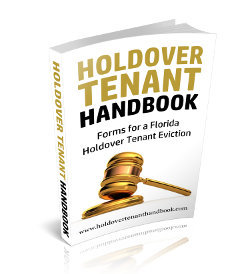They say that all good things must come to an end. This includes an at will tenancy. In this article, I will explain how to terminate a lease with an at will tenant in Florida. This will cover residential at will tenancies, although it’s basically the same for commercial leases as well.
What is an At Will Tenancy?
First of all, you may be wondering what an at will tenancy even is. The answer is simple: it’s a tenancy when there is no written lease in place. This may be referred to as a “month to month” tenant, week to week tenant, an oral lease ect. It’s when a written lease expires, or when parties lease property without a written agreement. Contrary to popular belief, Florida law does recognize oral leases. When there is no lease the tenant is considered an at will tenant.
If there is a Lease, look at the Lease
If there is (or was) any kind of lease in place, the first thing you want to do is look at the lease. Even in the case of the expired lease there may be language governing the termination of an at will tenant. If this kind of language exists then the lease usually controls.
For example, if the lease says that after it expires the tenant is a month to month tenant, and that the tenancy may be terminated with at least 30 days notice, then you need to give the tenant at least 30 days notice.
So always look at the lease and see if there is any specific language in the lease that may apply to your situation.
If there isn’t a Lease, or the Lease is Silent, Consult Florida Statute 83.57
If the lease is silent on termination for an at will tenant situation, or if there simply is no lease, then Florida Statute 83.57 controls. Conveniently, the statute is entitled “Termination of tenancy without specific term” and it allows for either party to terminate the lease by providing written notice (either mailed, hand delivered, or posted) that the lease is terminated.
The amount of notice you provide is determined as follows:
- When the tenancy is from year to year, by giving not less than 60 days’ notice prior to the end of any annual period;
- When the tenancy is from quarter to quarter, by giving not less than 30 days’ notice prior to the end of any quarterly period;
- When the tenancy is from month to month, by giving not less than 15 days’ notice prior to the end of any monthly period; and
- When the tenancy is from week to week, by giving not less than 7 days’ notice prior to the end of any weekly period.
At this point you may be wondering whether you have a year to year, quarter to quarter, month to month, or week to week lease. Good question. The way this is determined is based upon the frequency of payment of the rent per Florida Statute 83.46(2). So if rent is paid monthly, you have a month to month lease.
Therefore you need to give the tenant at least 15 days notice, in writing, prior to the day the rent is collected (typically the first).
Draft the Notice and Serve It
Once you determine the kind of notice you need, the next step is to draft the notice. That’s where having some good forms come in handy.
Once the notice is drafted it’s time to serve the notice on the tenant. I recommend hiring a process server to serve the notice. Usually this costs around $40. Process servers are professionals and I think it’s well worth it to have the notice professionally served. If the process server serves the notice while the tenant is home, the tenant will know you are serious. If the process server has to post it, I feel much more comfortable having the process server do that than the landlord. That way the tenant can’t argue that they didn’t “get” the notice. Worst case scenario, the process server could be called into a hearing or trial to testify that they properly served the notice. After all, that’s their job!
Don’t Collect any Rent After the Lease Has Been Terminated
Once your notice has been served it’s time to sit back and wait for the lease to be terminated and your tenant to leave. You can collect rent that’s already due, but if you want to kick out the tenant, you can’t collect rent for the rental period after the lease has been terminated. That would prevent you from evicting the tenants as holdovers.
Terminating At Will Tenancies – Final Thoughts
I hope that this article has shed some light on properly terminating at will tenancies. Please understand that this article is for educational purposes and is not intended to be used as legal advice.
Please click here for more information on form notices of termination, and other forms for holdover evictions, as well as form notices for purchase.
Click here to purchase the Holdover Tenant Eviction Forms Pack.
